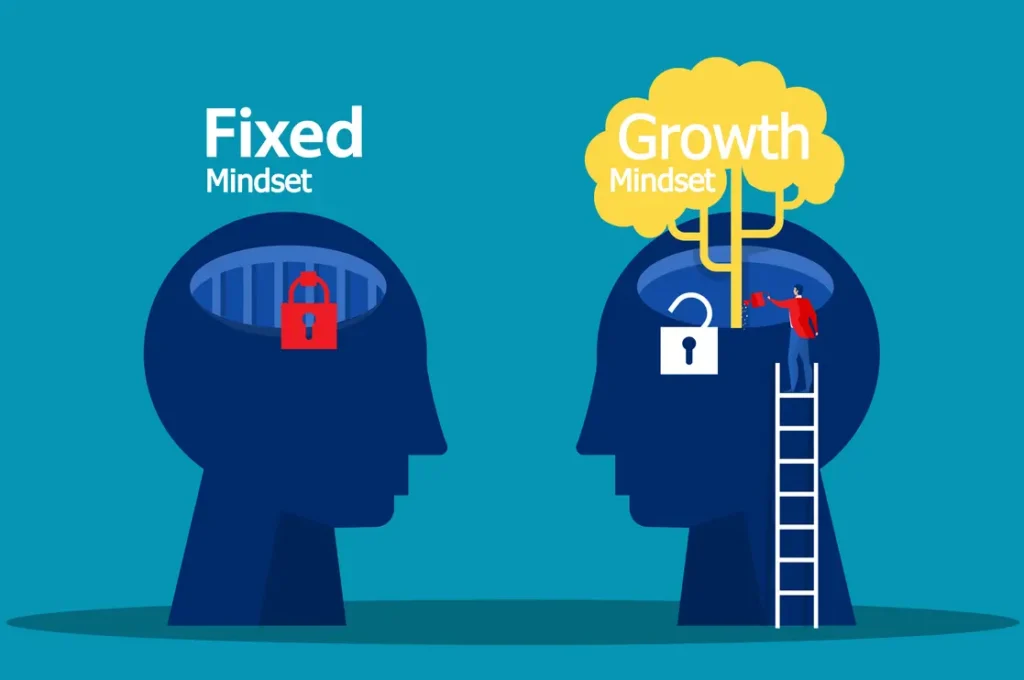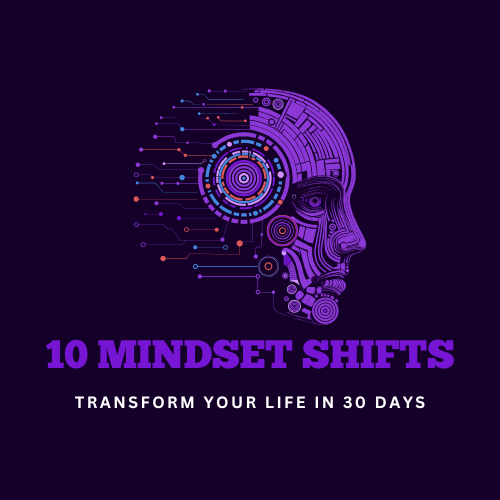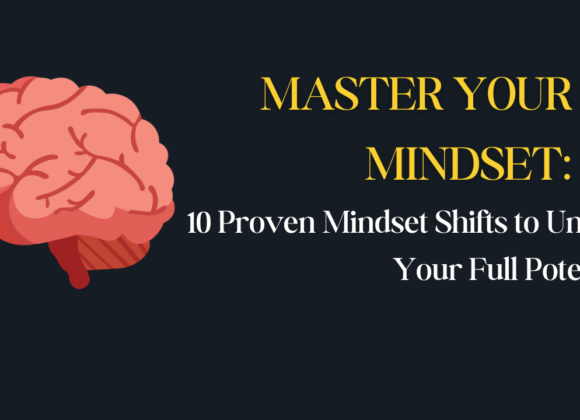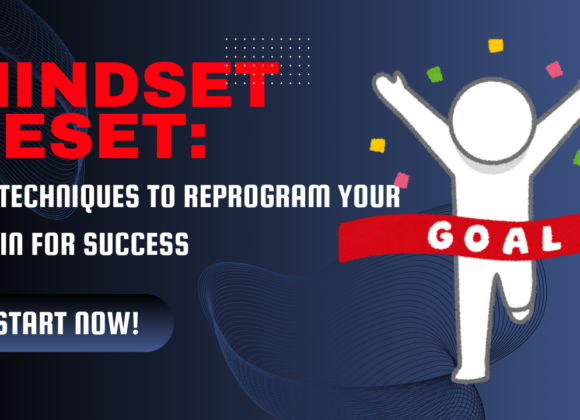Changing your life doesn’t always require a massive overhaul. Sometimes, all it takes is a change in perspective—a shift in mindset. A mindset shift is about altering the way you perceive challenges, opportunities, and yourself. These changes, when consistently practiced, can create a significant impact in as little as 30 days.
You might wonder, “Why 30 days?” Studies show that it takes around a month to form new habits. A 30-day commitment is manageable and effective enough to lay the foundation for lasting transformation. Ready to reshape your thinking? Let’s dive into these ten mindset shifts that can bring about a positive change in just a month.
Shift 1: Embrace a Growth Mindset

Definition of a Growth Mindset
A growth mindset is the belief that your abilities and intelligence can be developed through dedication and hard work. It’s the opposite of a fixed mindset, where people believe their talents are innate and unchangeable.
How to Develop a Growth Mindset in 30 Days
To foster a growth mindset, start by challenging your limitations. Every time you think, “I can’t,” replace it with “I can learn how.” Celebrate small victories and embrace challenges as opportunities to grow. Engage in activities that push your boundaries, whether it’s learning a new skill or taking on a daunting task.
Shift 2: Practice Gratitude Daily

The Impact of Gratitude on Mental Well-Being
Gratitude is a powerful emotion that can increase happiness and reduce stress. Studies have found that practicing gratitude rewires your brain to focus on the positives, making you more resilient during tough times.
Simple Ways to Incorporate Gratitude into Your Daily Routine
Start a gratitude journal where you write down three things you’re grateful for each day. You can also incorporate gratitude into your morning routine by taking a moment to appreciate the little things—like a warm cup of coffee or a beautiful sunrise.
Shift 3: Focus on Solutions, Not Problems

Changing Your Perspective to Solution-Oriented Thinking
Focusing on problems keeps you stuck, but a solution-oriented mindset empowers you to take action. This shift can dramatically alter how you handle setbacks and challenges.
Practical Tips for Shifting Focus from Problems to Solutions
Next time you encounter a problem, ask yourself: “What can I do to solve this?” Write down potential solutions instead of dwelling on what’s wrong. Break down complex issues into smaller, manageable tasks.
Shift 4: Let Go of Perfectionism

Understanding the Harm of Perfectionism
Perfectionism can lead to stress, anxiety, and procrastination. It’s the unrealistic expectation that you must be flawless, which often results in feeling never quite good enough.
How to Start Accepting “Good Enough”
Recognize that perfection is an illusion. Focus on progress rather than perfection. Practice saying, “Done is better than perfect,” and celebrate completing tasks even if they aren’t flawless.
Shift 5: Prioritize Self-Care Without Guilt

The Importance of Self-Care for Mental Health
Self-care isn’t selfish; it’s essential. Taking time for yourself improves mental clarity, reduces burnout, and enhances overall well-being.
Self-Care Habits to Cultivate Over 30 Days
Create a self-care checklist with activities like meditation, going for a walk, or reading a book. Schedule “me time” daily, even if it’s just 10 minutes, to do something that nurtures your soul.
Shift 6: Reframe Failure as a Learning Opportunity

Why Failure is Crucial for Success
Failure is not the opposite of success; it’s part of the journey. Learning from mistakes helps you grow and develop resilience.
Techniques to Change How You View Failures
Each time you fail, instead of feeling discouraged, ask yourself, “What did I learn from this?” Keep a “Failure Log” where you jot down what went wrong and how you can do better next time.
Shift 7: Start Each Day with Intention

The Benefits of Intentional Living
Living with intention means actively choosing how you want to experience your day. It’s about setting goals and aligning your actions with your values.
Morning Habits to Set the Tone for the Day
Create a morning ritual that includes goal-setting, mindfulness, or journaling. Set three priorities each morning that you want to accomplish, and reflect on them at the end of the day.
Shift 8: Cultivate a Positive Inner Dialogue

The Role of Self-Talk in Shaping Your Reality
Your thoughts influence your emotions and actions. A negative inner dialogue can sabotage your success, while a positive one can propel you forward.
How to Develop a Kinder Inner Voice
Start by catching yourself when you engage in negative self-talk. Replace critical thoughts with affirmations like, “I am capable,” or “I am enough.” Practice speaking to yourself the way you would encourage a friend.
Shift 9: Surround Yourself with Positivity

The Influence of Your Environment on Your Mindset
Your environment significantly affects your mindset. Negative people and places can drain your energy, while positive surroundings uplift you.
Strategies for Creating a Positive Environment
Spend time with people who inspire and support you. Declutter your space to make it more inviting. Add elements that boost your mood, like plants or inspirational quotes.
Shift 10: Take Responsibility for Your Life

Moving from a Victim Mentality to an Empowered Mindset
Blaming others for your circumstances keeps you powerless. Taking responsibility empowers you to make changes and shape your destiny.
Action Steps to Take Charge of Your Own Life
Adopt a proactive attitude by asking, “What can I do to improve this situation?” Keep an accountability journal to track the steps you’re taking toward your goals and celebrate your progress.
Conclusion
These 10 mindset shifts may seem simple, but their impact is profound. Over the next 30 days, commit to practicing each of these shifts and watch how they transform your life. Remember, mindset is the foundation for all change. With a positive and empowered outlook, you can achieve anything you set your mind to.
FAQs
- Can these mindset shifts really create a transformation in just 30 days?
Yes, if consistently practiced, these shifts can lead to noticeable changes within a month. Small, daily efforts build up over time. - What if I struggle with one of the mindset shifts?
It’s okay to struggle—transformation isn’t always easy. Focus on one shift at a time and be patient with yourself. Progress, not perfection, is the goal. - How can I track my progress during the 30 days?
Keep a daily journal to note your experiences, challenges, and wins. This helps you reflect on your progress and stay motivated. - Are there any books or resources that can help with these mindset shifts?
Yes, books like “Mindset” by Carol Dweck and “Atomic Habits” by James Clear are excellent resources for mindset transformation. - Can I focus on more than one mindset shift at a time?
It’s possible, but starting with one shift allows you to give it your full attention. Once comfortable, you can add more.





